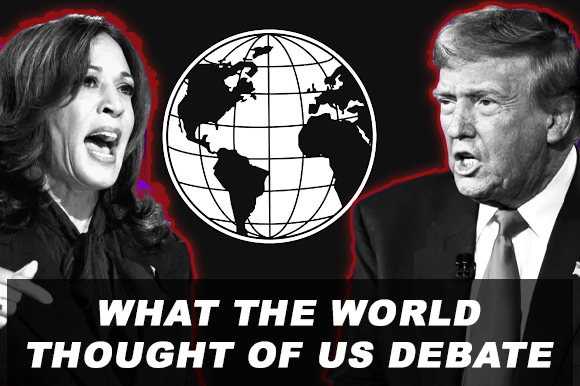The first showdown between Kamala Harris and Donald Trump was closely watched not only in the US but around the world.
The debate in Philadelphia featured some tense exchanges on foreign policy between the two presidential candidates.
From Beijing to Budapest, here’s how the debate went down, according to BBC foreign correspondents.
Mentions of Putin noted by Kremlin
By Steve Rosenberg, Russia editor, Moscow
Kamala Harris told Donald Trump that President Putin is “a dictator who would eat you for lunch.”
The expression “to eat someone for lunch” (or breakfast, or any other meal) doesn’t exist in Russian. But one thing you will find in Moscow is the appetite for a US election result that benefits Russia.
The Kremlin will have noted (with pleasure) that in the debate Trump sidestepped the question about whether he wants Ukraine to win the war.
“I want the war to stop,” replied Trump.
By contrast, Harris spoke of Ukraine’s “righteous defence” and accused Vladimir Putin of having “his eyes on the rest of Europe”.
Later the Kremlin claimed to have been irked by all mentions of Putin in the debate.
“Putin’s name is used as one of the instruments for the internal battle in the US,” Kremlin spokesman Dmitry Peskov told me.
“We don’t like this and hope they will keep our president’s name out of this.”
Last week Putin claimed he was backing Harris in the election and praised her “infectious laugh.”
Later a Russian state TV anchor clarified that Putin had been “slightly ironic” in his comments.
The presenter was dismissive of Harris’ political skills and suggested she would be better off hosting a TV cooking show.
Concern in Kyiv over Trump comments
By Nick Beake, Europe correspondent, Kyiv
Donald Trump’s failure, when asked on the debate stage to say if he wanted Ukraine to win the war, may not have surprised people here but it adds to their worry about what a second Trump term would bring.
Trump has long boasted he could end in the conflict in 24 hours, a prospect many Ukrainians assume would mean an incredibly bad deal with Kyiv forced to give up huge swathes of the land Russia has seized over the past two and a half years.
In contrast, Ukrainians will have been reassured by Kamala Harris’s responses, with no sign she would deviate from the current position of staunch American support.
She took credit for the role she’s already played, arguing she shared important intelligence with President Zelensky in the days before the full-scale invasion.
She then claimed Trump’s position would have been fatal for Ukraine had he still been in the White House. “If Donald Trump were president, Putin would be sitting in Kyiv right now.”
Publicly, there has been a deafening silence from Ukraine’s current ministers and senior military in reaction to the debate. The figurative US electoral battle is one they need not weigh in to while they’re consumed by real fighting at home.
Abdul memes follow Trump Taliban remarks
By Lyse Doucet, chief international correspondent
America’s longest war ended in August 2021 when it scrambled to pull out the last of its troops, and evacuate thousands of civilians, as the Taliban swept into Kabul with surprising speed.
That debacle made it into the debate and, not surprisingly, the issues were dodged, dismissed, distorted.
Harris veered away from the question “do you bear any responsibility in the way that withdrawal played out?”.
As a correspondent who followed the chaotic pullout closely, I never heard that the vice-president was in the room when decisions were taken in those final fateful weeks. But she made it clear she agreed with President Biden’s decision to leave.
Trump boasted that he talked tough with “Abdul”, the “head of the Taliban” who is “still the head of the Taliban.”
He seemed to be referring to Abdul Ghani Baradar, who signed the withdrawal deal with the US. But he never headed the Taliban, and has been sidelined since the Taliban takeover.
White House race keenly watched in Middle East
By Paul Adams, international correspondent, Jerusalem
The two candidates did not stray much from their previously stated positions last night, even if Trump did add, with characteristic hyperbole, that Israel wouldn’t exist in two years if his opponent becomes president.
Here in the Middle East, the race for the White House is being keenly watched.
With the war in Gaza raging and a ceasefire deal still elusive, some of Benjamin Netanyahu’s critics suspect that Israel’s prime minister is deliberately stalling until after the election, in the hope that Trump will be more sympathetic to Israel than Harris.
There’s a whiff of history perhaps being about to repeat itself.
In 1980, Ronald Reagan’s campaign team was suspected of urging Iran not to release American hostages held in Tehran until after he had beaten President Jimmy Carter, saying Reagan would give Iran a better deal.
Could something similar be afoot now? Certainly Netanyahu’s opponents believe he is now the chief obstacle to a ceasefire deal.
Harris has indicated that she might be tougher on Israel than Joe Biden, something Trump has seized on, saying last night that the vice-president “hates Israel”.
Palestinians, deeply sceptical about Donald Trump but dismayed by the Biden administration’s inability to stop the war in Gaza, are possibly inclined to see Harris as the lesser of two evils.


